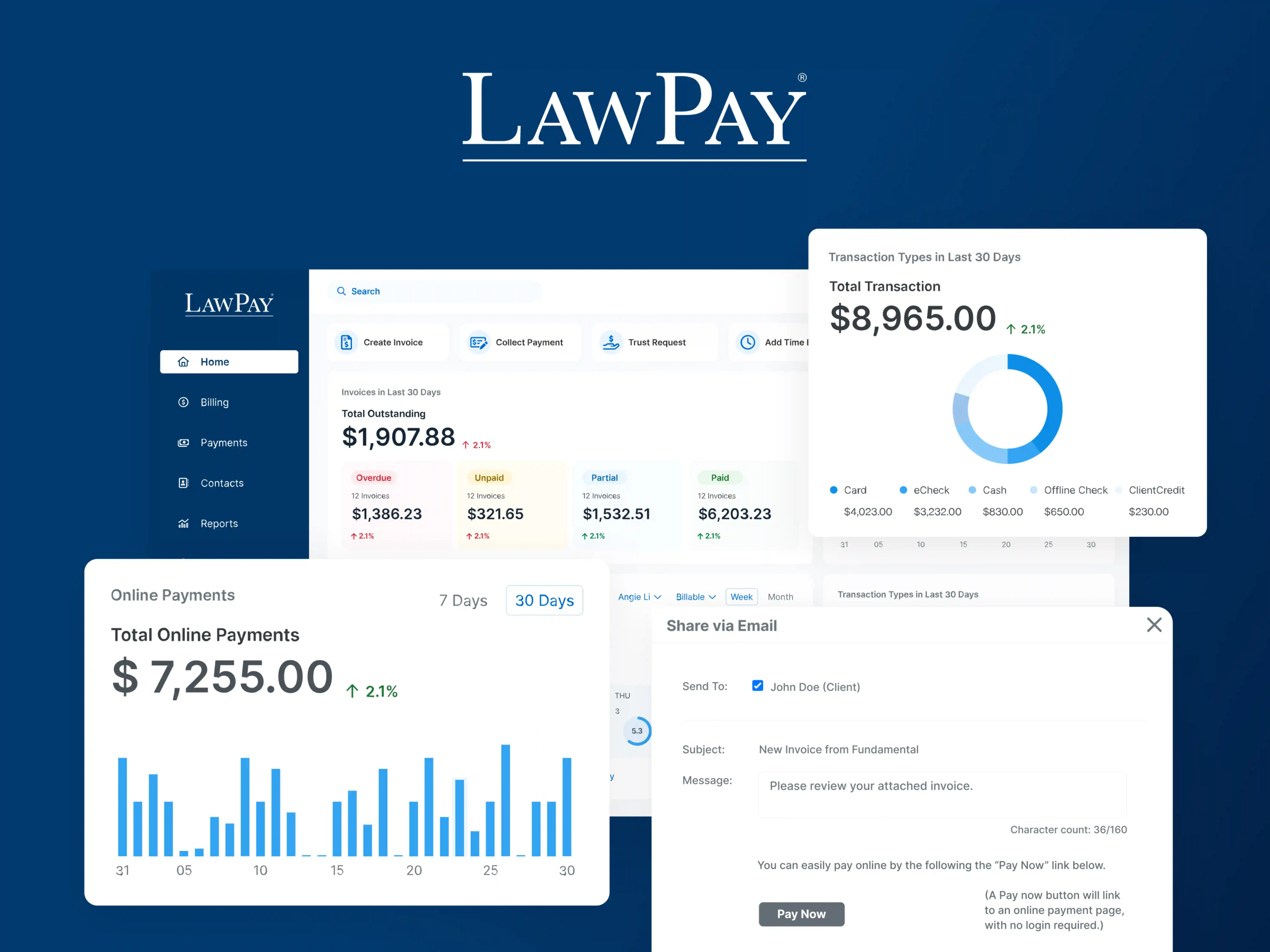Key takeaways
Law firms are increasingly accepting credit card payments from their clients.
To offset processing fees, credit card surcharges shift the costs of credit card transactions from the law firm to the client.
Credit card surcharges are legal in most jurisdictions, but they have caps and disclosure requirements.
Cash discounts are a more user-friendly option that steers clients away from using credit cards.
To improve your billing and payment systems, your law firm may be part of a growing trend of accepting client credit card payments. According to our 2025 Legal Industry Report, 82% of respondents reported that their firms accept credit or debit card payments through online payment processing software, up from 78% the year before.
For law firms, accepting credit cards can be an effective way to combat non-payment among clients. Accepting credit cards can encourage faster payment by giving clients greater flexibility and convenience. These features reduce friction and can help increase payment rates. In fact, 59% of law firms said that accepting credit and debit cards increased their law firms’ collection rates.
Credit card surcharges are a popular option to offset the costs of accepting credit cards; however, there is often confusion associated with rules and whether or not it’s permissible in certain states. In this article, we’ll provide an overview of surcharge laws nationally, explain how to implement them at your firm, and discuss the regulations and ethical guidelines that apply to law firms when imposing credit card surcharges on clients.
What is a credit card surcharge?
A credit card surcharge is an extra fee a merchant adds to a customer’s bill to compensate for some costs of payment processing. Each time a merchant accepts and processes a credit card transaction, they pay a credit card processing fee to the appropriate financial institution.
Businesses can only apply surcharges to credit card transactions. It is illegal to apply surcharges to debit card transactions, even when a debit card is treated like a credit card.
Surcharges are typically a percentage-based fee. For example, imagine a law firm that typically accepts cash or check payments from clients.
A customer with a $1,500 bill may request to pay with a credit card.
To accommodate the request, the law firm may charge the customer a 2% service fee, which is $30.
The client’s final legal bill with a credit card would increase to $1,530.
Are credit card surcharges legal?
Yes, it is legal for merchants, including law firms, to charge credit card fees in most states. Surcharging was largely outlawed for several decades until 2013, when a class action lawsuit permitted merchants in several U.S. states to implement surcharges in their businesses.
In 2017, another case involving passing on credit card fees to customers made it to the U.S. Supreme Court in Expressions Hair Design v. Schneiderman. New York business law prohibited surcharges on credit card transactions.
Expressions and several other businesses sued the state, arguing that the ban on surcharges violated their First Amendment rights.
In an 8-0 ruling, the Court stated that surcharge bans are laws that regulate speech, not conduct. Surcharge laws regulate speech by affecting how a business may communicate prices with its customers.
The Supreme Court sent the case back to an appellate court. The final ruling from the appellate court is that merchants may charge two different fees (a regular fee and a higher fee for credit cards) so long as the total credit card price is clearly communicated to customers.
While that case was focused solely on New York, many states have followed the state’s lead and have since updated their surcharging laws. Today, surcharge fees are legal in most states, although there may be stricter regulations on how a company applies them in different jurisdictions.
Credit card surcharge laws by state
The legal landscape of credit card surcharging fluctuates, but as of September 2025, credit card surcharging is legal in most states. However, there are nuances to be aware of. The following information highlights which states are experiencing changes in their surcharge rules, as well as the states where surcharges are legally permitted and prohibited.
When reviewing your state’s credit card surcharge laws, consider that these laws have frequently been challenged. Check your specific state Attorney General, legislature, or Consumer Protection Agency laws for up-to-date information.
States where credit card surcharge rules are in transition
Credit card surcharge fees are generally unpopular among consumers, which makes them a regular center of attention for state lawmakers. The states below have seen recent changes in their credit card surcharge rules.
California
Since 1985, it has been illegal to surcharge customers in California according to Civil Code section 1748.1. Beginning July 1, 2024, merchants must also adhere to SB 478 by listing prices that include the full amount a customer will pay. Sales and other applicable taxes are the only exception to this rule.
Colorado
Colorado permits passing credit card fees to customers under defined conditions. Surcharges may not exceed:
2% of the transaction total
The total cost of the merchant’s processing fees
Additionally, merchants must display notice of the surcharge so that customers can see it before making a purchase.
New Jersey
Previously, there were no specific laws governing credit card transactions in New Jersey. However, in August 2023, the state passed a law enshrining a regime similar to many other states.
Surcharge fees are legal if they do not exceed the merchant’s transaction costs. New Jersey also has strict disclosure laws for merchants.
Oklahoma
The previous law in Oklahoma banned merchants from imposing surcharge fees on cardholders. In May 2025, SB 677 repealed the ban on credit card surcharge fees.
Effective November 1, 2025, merchants in Oklahoma can begin imposing a surcharge on their customers. Regulations for the new surcharge fees include caps on surcharge fees and notice requirements.
Texas
Technically, surcharge fees are illegal in most circumstances in Texas. However, a federal court ruled that merchant fees are unconstitutional. So while surcharge fees are illegal, the state does not have a method to enforce these laws.
States where credit card surcharges are legal
In most states, it is legal for merchants to add a surcharge fee to customers’ bills. However, even though surcharge fees are legal, there are generally strict requirements.
States where surcharges are legal have limits on how much they can charge consumers (generally between 2%-4%). They must clearly communicate the surcharge fee to consumers in a place and manner where cardholders can see and acknowledge the surcharge before completing the transaction.
States A-L | States M-O | States P-Z |
|---|---|---|
Alabama | Maryland | Pennsylvania |
Alaska | Michigan | Rhode Island |
Arizona | Minnesota | South Carolina |
Arkansas | Mississippi | South Dakota |
Colorado | Missouri | Tennessee |
DC | Montana | Texas |
Delaware | Nebraska | Utah |
Florida | Nevada | Vermont |
Georgia | New Hampshire | Virginia |
Hawaii | New Jersey | Washington |
Idaho | New York | West Virginia |
Illinois | New Mexico | Wisconsin |
Indiana | North Carolina | Wyoming |
Iowa | North Dakota | |
Kansas | Ohio | |
Kentucky | Oklahoma* | |
Louisiana | Oregon |
*Beginning November 1, 2025
States Where Credit Card Surcharges Are Illegal
Originally, credit card surcharges were banned in almost every state. Today, the opposite is true as most states permit credit card surcharges. The number of jurisdictions that maintain bans on credit card surcharges has shrunk to just four states and one territory:
State | Explanation |
|---|---|
California | Cash discounts are permitted |
Connecticut | Cash discounts are permitted |
Maine | Only government entities can add a surcharge to credit and debit card purchases |
Massachusetts | Cash discounts are permitted |
Puerto Rico | Any attempt to offset credit card processing fees is illegal Cash discounts are not permitted |
How do credit card surcharges vs. cash discounts work?
A credit card surcharge is an increase in the customer’s bill, while a cash discount is a reduction in how much a customer pays if they choose to pay with cash instead of a card or check. This distinction is important as they both have different legal requirements and restrictions:
Surcharge: Generally, the prices listed in a business do not include surcharge fees for a credit card surcharge. These fees are added at the end of the payment and will lead to a higher bill than the customer originally expected.
Cash discount: Cash discounts are a customer-friendly approach that reduces how much a consumer is charged when paying. This discount incentivizes your clients to use a different payment method, like cash.

What are the credit card surcharging rules set by institutions?
Major credit card institutions like Visa and Mastercard set rules and regulations for merchants to follow when implementing surcharges. While there are slight variations among brands, general rules remain universal.
Notify the credit card institution
You are required to notify major credit card institutions—in writing—about your intent to surcharge. You may write a letter to your financial account representative or file paperwork provided on the credit card's website.
Failing to notify the credit card institution can potentially violate the card network operating rules. Breaking these rules can open your law firm up to financial penalties and possible regulatory penalties.
If you use a legal payment solution for credit card processing, like 8am™ LawPay, support teams can initiate the notification process on your behalf, saving you the first step.
Notify your clients
It's a legal requirement to make clients aware of your intention to surcharge. The explanation cannot be buried in a lengthy contract or disguised by the fine print.
In addition to financial and legal penalties, clients who weren’t notified beforehand can dispute the fee with their credit card issuer and initiate a chargeback request. In serious cases, credit card companies may revoke your firm’s processing privileges.
You may avoid this by including the credit card surcharge on your invoice or displaying a sign at your office. If you're using an online payment solution, you can add this notice to your payment page. Taking these proactive measures can help your law firm prevent chargebacks.
Do not surcharge more than the cost of your processing fee
This rule stipulates that you cannot use surcharging as a means to make a profit. In general, a surcharge cannot exceed 4% in the U.S. However, there are exceptions in some states to consider before implementing a surcharge fee.
For example, in Colorado, merchants may either:
Surcharge a maximum of 2%, or
Charge the actual cost the company pays for credit processing.
Surcharge caps are generally established at the state level, and law firms that don’t adhere to them risk fines and greater regulatory scrutiny.
Do not implement surcharges on debit card transactions
Surcharge fees are strictly limited to credit card transactions only. Even if a client wishes to run a signature debit transaction, where a debit card is processed as a credit transaction, you are still not allowed to implement a surcharge. Surcharges are also not applicable to prepaid cards.
List surcharges as separate line items
When drafting an invoice and tallying up transactions, you cannot lump the surcharge into the service's total cost. Each surcharge is typically required to be listed separately on your invoice and labeled clearly as a surcharge.
This practice reinforces transparency and clarifies to clients that they are being charged an additional fee for using a credit card. It also simplifies the reconciliation process for lawyers, allowing for easy tracking and recording of processing fees.

Stay PCI compliant
While not a surcharging rule per se, Payment Card Industry (PCI) compliance is an important credit card payment rule to be aware of. If your law firm accepts credit card payments, you are required to remain compliant with the Payment Card Industry Data Security Standard, or PCI DSS.
This set of security standards established by the major card brands ensures that all companies accepting, processing, storing, and transmitting credit card information are maintaining a secure environment to prevent stolen or compromised information.
As a result, your firm is required to complete an annual compliance questionnaire regarding how your office handles credit card information.
To remain PCI compliant, your attorneys can take action to protect your clients’ sensitive information. This includes securing cardholder data, using a PCI-compliant payment system, establishing a secure network, and providing ongoing training to staff.
Simplify surcharging and PCI compliance with 8am™ LawPay
Surcharge compliance is ever-changing and anything but simple to navigate. But it doesn't have to be a point of stress for your firm. As a Level 1 Service Provider for PCI DSS compliance, LawPay helps law firms with PCI compliance and surcharges through a suite of features and support.
As an end-to-end platform, our payment processing software fully integrates into our legal invoicing solutions. Smart features, including auto detection of debit cards, limit the risk of violating surcharge laws in your jurisdiction.
Our built-in PCI questionnaire simplifies annual compliance, shortening reviews to just 5-10 minutes for many law firms. Together, these benefits save your law firm time, limit compliance risk, and provide a simpler payment solution to your clients.
At LawPay, we’re committed to ethical and secure credit card processing for law firms. To learn how we can help your firm, sign up today.
Schedule a demo to see what LawPay can offer your firm.
Book Now
FAQ about credit card surcharges
About the author

Gabriela JheanContent Writer
Gabriela Jhean is a Content Writer for leading legal software companies, including MyCase, Docketwise, CPACharge, CASEpeer, and LawPay—the #1 legal payment processor. She covers emerging legal technology, financial wellness for law firms, the latest industry trends, and more.
